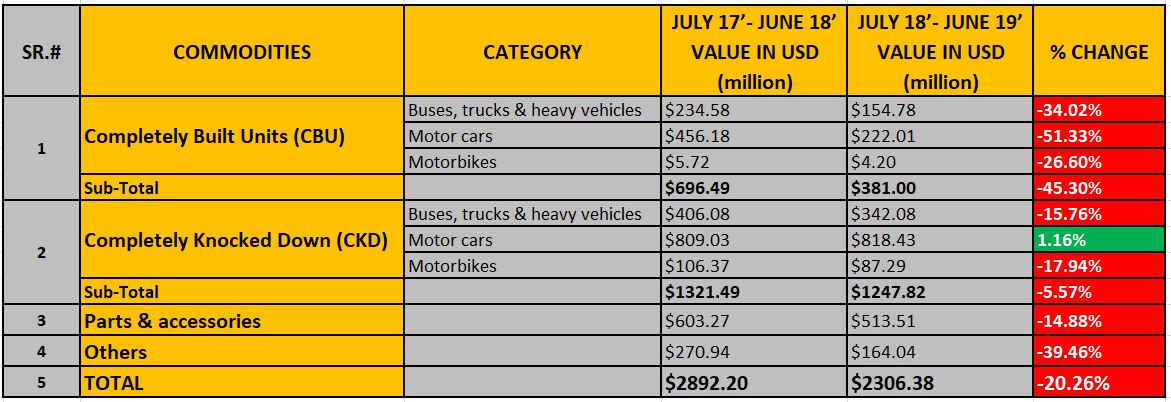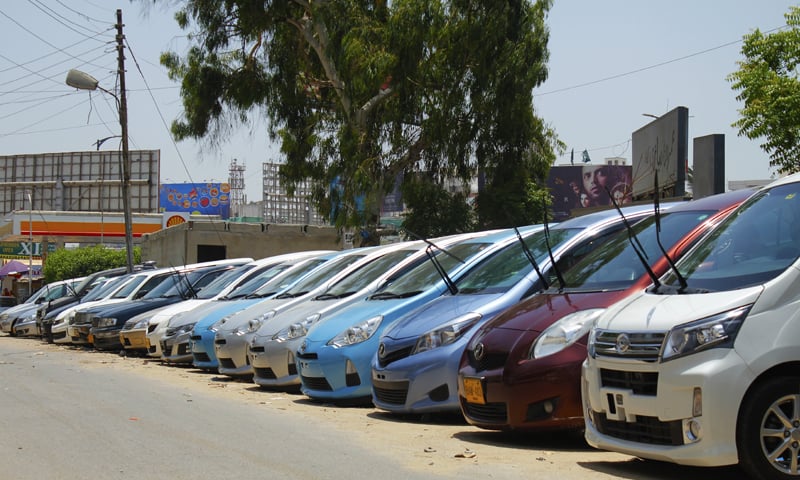According to the stats revealed by the Pakistan Bureau of Statistics for June 2019, the import of motor vehicles and spare parts has declined substantially owing to the regulatory measures taken by the government in reducing the imports.
The current government is keen to reduce the imports in the country and hence discouraging it in the automobile industry as well. The ministry of commerce issued SRO 52(I)/2019 on 15th January 2019 according to which the taxes and duties on these imported vehicles will be paid in the foreign exchange arranged by either the nationals of Pakistan or local recipient supported by bank encashment certificate. This particular certificate is proof of the conversion of foreign remittance to the local currency. It has also been made compulsory that the remittance used for paying the duties and taxes shall originate from the account of a national of Pakistan sending the vehicle from abroad. In case his account doesn’t exist in Pakistan, the remittance shall be received in the account of his/her family member.
During the current fiscal year, the imports of completely built units of cars dropped to $222.01 million as compared to $456.18 million in the previous year, thus posting a decline of 51.33%. Similarly, the import of motorbikes in this category slipped 26.60% from $5.72 million to $4.20 million in the current fiscal year. The heavy vehicles, including buses and trucks, also went down by 34.02% from $234.58 million to $154.78 million in the period under review. The overall import of CBU’s declined by a hefty 45.30% from the previous figure of $696.49 million to $381.00 million during the period from July 2018 to June 2019.
The drop in the imports of completely knocked down units (CKD) was comparatively less significant as the value of overall imports of CKD units went down from $1321.49 million to $1247.82 million with a percentage drop of 5.57%. The value of import of heavy vehicles including buses and trucks dropped by 15.76% from $406.08 million to $342.08 million whereas the same for motorbikes declined by 17.94% at $87.29 million from $106.37 million. However, a slight increase in the imports of motor cars in this category was observed with a rise of 1.16% from $809.03 million in the previous year to $818.43 million. It was mainly due to the restriction on the import of vehicles by the government hence increasing the demand of locally assembled vehicles.

On the other hand, the total value of imported parts and accessories also decreased by 14.88% to $513.51 million from the last year’s $603.27 million. The overall imports in the automobile industry posted a decline of 20.26% from $2892.20 million to $2306.38 million during this year.
The restriction on the import of vehicles and a sharp depreciation in the value of rupee against the US dollar is referred to as the major contributors in reducing the overall imports in the country. Pakistani currency devalued almost 34% in just last year, which has also compelled the auto manufacturers in the country to increase the prices of their cars multiple times. It has further dented the industry as the new investors are so much uncertain about the future of vehicles in the country. However, discouraging the imported vehicles is a good step to encourage the local industry to grow to its potential. But for that to happen, the government also needs to bring consistency in its policies. The additional duties and taxes levied on the locally assembled cars should be waived off to allow the new players to invest in the local auto sector with full confidence.
How do you see the current situation in the auto sector? Let us know in the comments space below and stay connected with PakWheels for more updates on the automobile industry.


